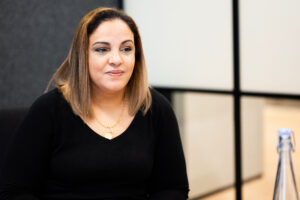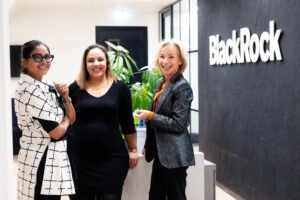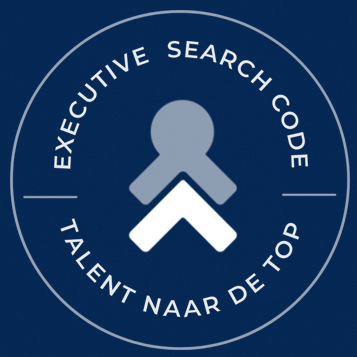Interview with Hanane Saih Chief Risk Officer – BlackRock Netherlands
‘I am just one voice on behalf of many’
For Partners at Work, encouraging diversity in the broadest sense has been a guiding principle in all search assignments for many years. Among other things, multicultural diversity has proven to be of value in getting the best out of organisations. Christine Changoer speaks in a series of interviews with multicultural leaders who have been mediated by Partners at Work in their roles. She explores what different cultural backgrounds and ethnicities can add. But also the challenges that multicultural leaders faced on their way to the top. Along with her colleague Ingrid Reichmann, this time Christine sat down with Hanane Saih, CRO at BlackRock Netherlands.
The greeting at the top of the Amsterdam Rembrandt Tower is very cordial as Ingrid and Hanane already know each other well. Indeed, last summer, Ingrid played an intermediary role in Hanane’s move to the world’s largest asset manager, BlackRock. At its core, the career path of Moroccan-born Hanane bears some resemblance to the history of her current employer. It started very small in both cases, only to grow along a path of constant change into something much bigger. Her cradle was in Nouaceur, a small town close to Casablanca and near that city’s biggest airport. ‘There I grew up in the cosmopolitan part of the country, in a loving and typically Moroccan-Arab middle-class family. My father was head of a high school. Indeed, in Morocco, the first two years of secondary education are housed within a separate school.’
Family matters
Hanane’s mother is a strong woman, she tells. ‘At a very young age, my mother lost her father. My grandmother could afford not to work and devoted herself to her family because of what my grandfather left behind financially. So my mother grew up almost entirely without a father. As the eldest of three girls, this gave her many responsibilities at an early age.’ After that formative childhood, she met her husband and started a family of four sons and a daughter. After her second child was born, Hanane’s mother stopped working to devote herself entirely to her family, just as Hanane’s grandmother had done. Despite the relatively good salary of her father there was no room for luxuries. In fact, there were regular money worries. ‘I learned at an early age that money does not make you happy. I try to instil that in my own children too.’
‘There is only one tool that helps us succeed in life and that is education’
True happiness lies, for example, in a loving family. ‘During holidays we just stayed at home and made it a cosy place. My mother prepared tasty things in the kitchen and we watched our favourite TV shows.’ Besides interconnectedness, intellectual development was also considered essential. Hanane’s brothers currently hold top positions in the worlds of science and consultancy. ‘There is only one tool that helps us succeed in life and that is education. We got that message very clearly from our parents. Private education in Morocco was only for the social elite. I went to public schools, enjoyed learning very much and was ambitious; it gave me a thrill to be the best in my school class.’
Ticket to the world
At 14, Hanane already started flying out a bit, as she commuted daily from home to Casablanca to study mathematics at high school. At 18 she received a scholarship with which she continued her studies in France at an engineering school, where she also specialised in mathematics and finance. Hanane’s graduation proved to be her ticket to the international world of financial services. ‘Because I followed the path of quantitative finance it was obvious that I would work in financial services. But for me, graduation primarily was a ticket to be able to go abroad. I wanted see what the world had to offer me.’ The first door that swung open was to the City of London, where Hanane started her career as a quantitative analyst. ‘I worked as a consultant for three banks in two years learning a lot at a very fast pace.’
Hanane then traded the City for financial roles in Melbourne, Hong Kong and Singapore, living in very culturally diverse environments. This was also true when she settled in the Netherlands in 2010 to work in ING’s dealing room. Diversity has thus been a constant in her life from the moment she left Morocco.
 ‘If you push inclusion too much you run the risk of diversity washing’
‘If you push inclusion too much you run the risk of diversity washing’
Hanane lives in Amstelveen with her husband and two kids. He, is Moroccan and grew up in the Netherlands. ‘He has, as we call it, an old soul. He taught me to look at people’s discriminatory remarks with mildness and not to take it too hard.’ Inclusiveness starts with embracing your background, she adds. Because only when you are happy with who you are can you be truly open to others. ‘Diversity and inclusion are a process, both on a personal – and macro level. For me that was quite a journey, after all; I come from a small Moroccan not very diverse town,’ she says, laughing. By now she has reached a point where she can not only be proud but also kind to herself. ‘I realise that perfection does not exist and dare to show my weaknesses. That only makes you stronger. Moreover, because I make sure I always keep learning I keep developing on this topic too.’
From the start it has been Hanane’s consistent choice not to approach inclusion negatively, but to try to enforce it in a positive way. For instance by increasing knowledge and awareness. However, inclusion is work in progress. At a macro level this process is not going to settle itself automatically, she stresses. ‘I have a very down-to-earth view upon it: yes progress is being made, but countries are simply not all at the same level on this. There is a good movement going on towards more inclusion, at the same time there is still much to be gained before we can all live and work together in mutual acceptance and harmony.’
Diversity washing looms
As Hanane shifts her gaze from society as a whole to organisations working on inclusion, another warning is on her lips. If you push this process too much you run the risk of diversity washing. Inclusion can only succeed if an organisation believes in it and the management wants to carry it through. ‘As CRO in this organisation, I have my own responsibility in the process. That is to try to understand why colleagues act as they do. When I was younger, I reacted to things spontaneously and directly. Now I want to understand why people do what they do first before I try to raise awareness on inclusion.’ Inclusion at the macro level is, according to Hanane, both a top-down and bottom-up issue, and it affects all people from many different backgrounds. We all have a shared responsibility in this, she believes.
‘How I lead depends on the people around me’
Her own background helps her also appreciate others for who they are. ‘You often find that people from completely different backgrounds are surprisingly similar to you when you get to know them better.’ At BlackRock, she works in an environment where broad diversity comes naturally, which also seems to apply to inclusion. ‘There is an eye for everyone, which is evident from everything. I only have to think about the way I was welcomed here, I haven’t experienced that at any other company.’ Whereas other companies often pay scant attention to the history and identity of their organisation in the onboarding phase, BlackRock runs a mandatory course on its amazing history. It is one of many courses employees can take at the so-called BlackRock Educational Academy.
Since July, Hanane has been the CRO of BlackRock Netherlands . a. When asked about her leadership style and how her colleagues see her as a leader, she replies that she does not use just one style. ‘How I lead depends on the people around me, to them I adapt my leadership style. In doing so, I focus on what they need. Some are happy when I tell them exactly what I expect, others prefer to have a lot of room for their own initiatives.’ That said, there is definitely a leadership style that Hanane prefers. ‘I like transformational leadership. That’s how I lead my life privately too. I love discovering new things and I believe that a person can develop and improve through change. Even if a change is not beneficial, it can never be completely wrong as you always learn something from it. It helps you take a better next step.’
 ‘It is a big responsibility to be a role model, I prefer to indicate I am just one voice on behalf of many’
‘It is a big responsibility to be a role model, I prefer to indicate I am just one voice on behalf of many’
Partly because of the space Hanane is given to continuously change, she feels completely at home at BlackRock. Conversely, she is appreciated in part because of her rare ability to learn new things very quickly. Finally, when asked whether she feels she is a role model for young women from different backgrounds, she replies she does not like that characterisation. ‘It is too heavy a burden on my shoulders to be a role model. I prefer to say that I am just one voice on behalf of many. My life journey is not out of the ordinary, there are many like me. Within my team at RQA (Risk and Quantitative Analysis) alone, there are three women with the same background as me. Although admittedly BlackRock is a large and diverse company, I am not extra special. There are many others with similar stories and paths who have also benefited from education and hard work. Once that whole group becomes more visible you really help younger women with similar backgrounds to grow so that younger generations also see them and are inspired by their achievements. It is essential that our children see that a woman from a diverse background can make a career and achieve a lot. That would also be my final message: in the whole discussion around diversity and inclusiveness, reinforce what is positive and raise people’s awareness. Only then can we create a better, more diverse and harmonious world.’
Tekst: Baart Koster
Fotografie: Bettina Traas

